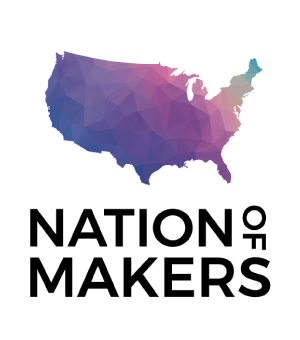Making the Case: ECONOMIC DEVELOPMENT
Prototyping ideas for new products has never been easier. Affordable and powerful digital fabrication tools available to the public in community, private sector and educational makerspaces allow for unparalleled access to economic opportunities to create new products, businesses and jobs. These spaces also serve as business incubators, allowing entrepreneurs affordable access to small batch production facilities while they are getting off the ground. Investing in these spaces—and connecting traditional economic development efforts to them—is cost-effective and a critical strategy to ensure U.S. economic prosperity.
POLICY OPPORTUNITIES
Invest in makerspaces as regional tech hubs and community innovation ecosystems. Create a federally-funded / local-match revolving, forgivable loan fund, and/or New Markets Tax Credits to offer resources for facility capital improvements and capacity building.
Build pathways, programs and relationships between NIST’s regional MEPs (Manufacturing Extension Partnerships) and makerspaces.
Create opportunities for distributed manufacturing networks (composed of smaller manufacturers) to market aggregate production and compete with larger suppliers.
Partner with makerspaces to sponsor innovation contests.
Case Studies
Kerala Startup Mission—An Innovation Ecosystem
In 2015, the Indian State of Kerala’s KSUM (Kerala Startup Mission) began building an infrastructure across the state of fab labs and makerspaces for the purposes of economic development. The innovation ecosystem infrastructure today consists of a large central research and incubation fab lab, two incubator fab labs, and approximately 50 mini-fab labs, maker spaces and IoT spaces focused on education, entrepreneurship and academic research. These spaces are connected to academics, industries, R&D institutions and startups forming an innovation ecosystem. KSUM uses the innovation ecosystem to develop both the workforce and the entrepreneurial mindset, with fab labs and makerspaces as a core infrastructural element in this ecosystem. Using this model, to date they have incubated 2,200 startups that have raised $89 million in funding, cultivating 80+ investors in the state, with 10 active Venture Capital firms.
Carolina Textile District: An Innovation Hub for Materials and Domestic Textile
The Carolina Textile District (CTD) connects makers, designers, and entrepreneurs to a reliable domestic supply chain in order to make quality products here in the U.S.A. An enterprise of The Industrial Commons, a unique cooperative ecosystem based in Western North Carolina, CTD is committed to empowering workers and supporting local communities by providing secure, meaningful jobs, and through “aspiring to economic, environmental, and social sustainability” in every aspect of their work.
SFMade: An Engine for Local Manufacturing
SFMade is a 501(c)(3) nonprofit organization in San Francisco, CA that supports local manufacturers who create jobs and career pathways for local residents who have overcome barriers to employment for a more vibrant, equitable, and resilient economy. Founded in 2010, SFMade has emerged as a full-service hub that connects low-income job seekers to employment and training opportunities; provides local manufacturers with educational resources and customized, one-on-one services; and arms policymakers with strategies and intelligence to create the conditions for home-grown manufacturers and their employees to thrive. At the heart of SFMade’s work is the belief that local manufacturing taps into the unique identity and spirit of the city and the region, and an economy that prioritizes the workers, entrepreneurs, and artisans who make things has the potential for greater social and environmental impact.



